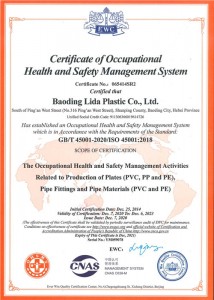Aug . 31, 2024 03:22 Back to list
PPR Hot Water Pipes - Durable, Reliable, and Efficient Solutions
Understanding PPR Hot Water Pipes Benefits and Applications
PPR (Polypropylene Random Copolymer) hot water pipes are a revolutionary solution in the plumbing and piping industry, known for their versatility and reliability. With increasing demand for efficient and durable plumbing systems, PPR pipes have gained significant popularity worldwide. In this article, we will explore the characteristics, benefits, and applications of PPR hot water pipes.
What is PPR?
PPR is a type of thermoplastic pipe made from polypropylene, a polymer that offers superior performance over traditional materials such as metal and PVC. PPR pipes are created through a random copolymerization process, which results in a flexible yet robust material. These pipes are available in various sizes and thicknesses, making them suitable for a wide range of applications.
Benefits of PPR Hot Water Pipes
1. High Temperature Resistance One of the most notable features of PPR hot water pipes is their excellent heat resistance. They can withstand temperatures up to 95°C (203°F) without deforming or losing structural integrity. This characteristic makes them ideal for hot water distribution systems in residential and commercial buildings.
2. Corrosion and Scale Resistance Unlike metal pipes that corrode over time, PPR pipes do not rust or suffer from scaling. This property significantly extends their lifespan and ensures the quality of the water being transported. Additionally, the smooth interior surface of PPR pipes minimizes the risk of blockages, leading to better flow rates.
3. Lightweight and Easy to Install PPR pipes are lightweight compared to traditional materials, making them easier to handle and install. Their installation requires fewer tools and can often be completed more quickly, which can lead to reduced labor costs.
ppr hot water pipe

4. Environmentally Friendly PPR pipes are free of harmful chemicals and can be recycled, making them an environmentally friendly choice. Additionally, their durability means less waste over time, contributing to sustainable construction practices.
5. Cost-Effectiveness Although the initial cost of PPR piping may be higher than some alternatives, their longevity and minimal maintenance needs ultimately provide significant savings over time. Their resistance to leaks and repairs reduces overall expenditure for homeowners and businesses.
Applications of PPR Hot Water Pipes
PPR hot water pipes are versatile and can be used in a variety of applications, including
- Residential Plumbing Ideal for hot and cold water supply lines in homes, PPR pipes are commonly used for sink, shower, and heating systems. - Heating Systems They are highly effective in underfloor heating systems due to their thermal conductivity and resistance to high temperatures.
- Commercial and Industrial Use PPR pipes are suitable for large-scale applications such as hospitals, hotels, and manufacturing facilities where reliable hot water supply is critical.
- Renewable Energy Systems PPR pipes are used in solar heating systems, leveraging their ability to withstand high temperatures.
In conclusion, PPR hot water pipes offer a multitude of benefits that make them an excellent choice for modern plumbing needs. Their resilience, cost-effectiveness, and environmentally friendly nature position them as a suitable alternative to traditional piping materials in various applications. As the demand for efficient and sustainable plumbing solutions continues to grow, PPR pipes will undoubtedly play a crucial role in shaping the future of water supply systems.
-
Durable PP Rigid Sheet: Lightweight, Chemical Resistant Solutions
NewsAug.21,2025
-
PVC Grey Sheet for Extraction: Chemical Resistant & Durable
NewsAug.19,2025
-
Durable PVC Pipe Fittings for Plumbing & Irrigation Needs
NewsAug.18,2025
-
HDPE Steel Belt Reinforced Spiral Corrugated Pipe | High Strength
NewsAug.17,2025
-
HDPE Pipe Fittings: Durable, Leak-Proof Solutions
NewsAug.16,2025
-
Premium CPVC Sheet: High-Temp & Chemical Resistant Solutions
NewsAug.15,2025

